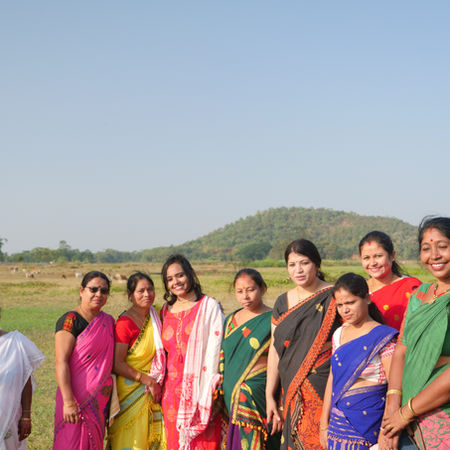
The Hargila Party
The Hargila Party was conceived in Dadara Village, Assam, where the local women’s group, Hargila Bahini, is renowned for their grassroots conservation of the endangered greater adjutant stork. My involvement was both as participant and observer, fostering a respectful collaboration and open dialogue with community members. Inspired by Judy Chicago’s feminist installation, The Dinner Party, the central event featured an equilateral triangle formation of women, symbolizing equality, strength, and the womb—centuries-old icons of the feminine. This group of over forty women converged, sharing stories, singing, and dancing, transforming the space into a pulsating hub of collective activity.
The focus was to honour their daily labor in caring for the environment and the stork, not as passive observers but as active co-creators. This was achieved through dialogical aesthetics, relational engagement, and an emphasis on invisible yet powerful community bonds. Each participant had the opportunity to share her joys, struggles, and dreams, making the communal space one of genuine empowerment. The process—rather than its final form—was central, emphasizing life’s significance and interconnectedness.
Leadership was visibly horizontal: Dr. Purnima Devi Barman, the movement’s founder, sat evenly among others, reinforcing non-hierarchical collaboration. The outcome was not just celebratory but transformative; women took a collective oath to protect their environment, followed by sharing a simple, locally prepared meal—food functioning as a potent tool for intimacy and dialogue.
Witnessing hargila storks soaring above the gathering served as a symbolic reminder of the project’s harmony with place, landscape, and community. In essence, the Hargila Party sought to create a grassroots framework for conservation and empowerment, building on tradition but adapting to present needs—a vivid example of how art, dialogue, and ecological stewardship interweave to foster agency, renewal, and social change.
Gallery







